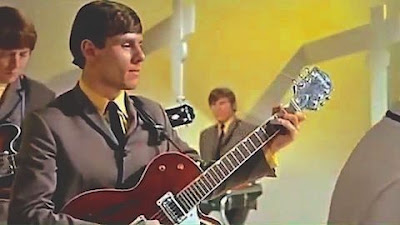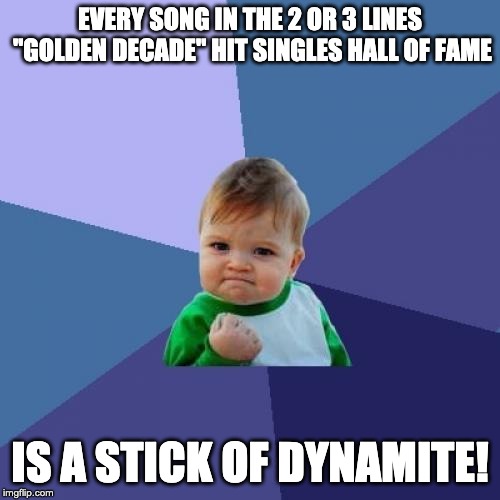Love you every day, girl
Always on my mind
One thing I can say, girl
Love you all the time
[NOTE: The Beatles released close to two dozen singles that are worthy of serious consideration for the 2 OR 3 LINES “GOLDEN DECADE” HIT SINGLES HALL OF FAME. But none of them really stand out, so it wasn’t easy to decide which one to pick as the first Beatles single to induct into my wildly popular little hall of fame. I ended up picking “Eight Days a Week” for two reasons: (1) it’s as good as any other possible choice, and (2) director Ron Howard gave that title to his fascinating documentary movie about the Beatles’ touring days. I wrote three posts about that documentary and the Beatles in general in October 2016. What follows is a slightly edited version of the third of those posts, which I think absolutely nailed it.]
In his review of Ron Howard’s new documentary,
The Beatles: Eight Days a Week – The Touring Years, Tom Shone of
Newsweek describes the Beatles as “the original and best boy band.”
It may seem blasphemous to lump the Beatles in with boy bands like One Direction, the Backstreet Boys, ’N Sync, the Bay City Rollers, and the Monkees because the Beatles eventually matured into something very different from those boy bands.
But The Ed Sullivan Show-vintage Beatles – the Beatles of “She Loves You” and “I Want to Hold Your Hand” and “Can’t Buy Me Love” — were not only a boy band, but the original boy band.
The Beatles had a Svengali-like figure who took control of their career – Brian Epstein, who took the scruffy, leather-jacket-clad lads from Liverpool (by way of Hamburg) and put them in natty matching suits with matching haircuts. And having a Svengali pulling the strings is de rigueur for a boy band.
More importantly, the Beatles had a legion of insanely devoted fangirls, which is even de rigueur-er for a boy band.
 |
| Beatles fans |
When I saw Eight Days a Week last weekend, I was struck by just how many of the fans at Beatles concerts were teenaged girls too young to have a driver’s license. (I’m guessing about 99% fit that description.)
Writing on Vulture.com, Jillian Mapes notes correctly that “Beatlemania established the barometer by which all other boy-band-demonium has been gauged. Is that not the defining aspect of what separates a boy band from merely an all-male pop group?”
Makes goes on to explain what made the Beatles uniquely appealing to their fangirls:
Certainly Elvis and even a young Sinatra inspired similar reactions in teen girls, and doo-wop and R&B groups had proven that there's a certain magic in male voices playing off each other. But the Beatles marked the first time listeners were able to customize their fandom by claiming one of four distinct personalities that corresponded to their romantic tastes. This is the model more or less emulated by every wildly successful boy-band since: a boy for every type of girl (however laughably reductive that may be).
Why did girls scream at Beatles concerts?
Rachel Simmons, whose website describes her as “an author, educator and coach helping girls and young women grow into authentic, emotionally intelligent and assertive adults,” believes that concerts give young females who are socialized to be polite, modest “good girls” an opportunity to let it all hang out:
In their day-to-day, non-concert-going lives, girls don’t have a lot of permission to scream. A concert offers an oasis from the daily rules about being good girls. Screaming is about letting go and leaving the confines of being the self-conscious pleaser.
Simmons also believes that screaming at a concert allows teenaged girls to be part of a group but also express themselves as individuals:
Adolescent girls are really invested in the acceptance of their peers. But there’s a competitive element to fandom and fangirling — and screaming is an expression of that fandom. So girls are doing it not only to assert their passion for the band, but to compete with each other and to signal to each other that, “This is what I care about.” It’s part competition, but partly a way to connect. During adolescence for girls, that’s a very complex and important drive.
I don’t find Ms. Simmons’s theory very persuasive, so I did some research to see what science might have to say about why fangirls scream at boy-band concerts.
Professor Harold Gouzoules, the chairman of the psychology department at Emory University, has been studying how rhesus monkeys use screams to communicate for years. He believes that screaming by humans is also a means of communicating, and that the message that screamers are communicating is generally the same one: LOOK AT ME!!!
According to Professor Gouzoules,
If you got back to Nazi rallies in the ’30s, when Hitler was rising to prominence, there are historical accounts that young women were screaming. There’s something about that kind of social event — there’s excitement being generated by somebody who has power or authority. . . . And those screams are attention-getting. That’s how they serve monkeys. That’s how they serve us a lot of the time.
In other words, young girls at Beatle concerts screamed for the same reason that young girls at Nazi rallies screamed and the rhesus monkeys that Professor Gouzoules observed screamed: because they were desperate for attention.
The girls who attended Beatles concerts did a lot of screaming. They also cried and fainted. But that’s not all they did.
From the Huffington Post:
Multiple people have claimed Beatles shows were known for their urine. Notably, John B. Lynn, son of the owner of a venue the Beatles played, told The Washington Post that the concert hall smelled like the pee of overexcited girls after the show.
From Digitalspy.com:
Bob Geldof has admitted that he associates the Beatles with the smell of urine.
The singer revealed that he was stunned by the large number of young girls "pissing themselves" at a Beatles concert he attended in the 1960s and can no longer remember the band without thinking of the incident.
"The Beatles was a case of watching females in excelsis. It's the old cliché, but you couldn't hear them for all the screaming," he told Q magazine.
"I remember looking down at the cinema floor and seeing these rivulets of piss in the aisles. The girls were literally pissing themselves with excitement. So what I associate most with the Beatles is the smell of girls' urine."
(Hopefully, Geldof’s memory is better than his Latin. In excelsis means “in the highest.” I think Sir Bob meant to say in extremis.)
Click below to buy a new remastered version of the Beatles’ Live at the Hollywood Bowl album, which is a companion to Ron Howard’s Eight Days a Week movie:



























